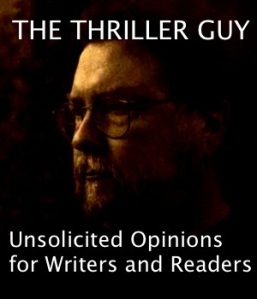So Long Thriller Guy… Yeah, We Knew Ye
By Larry Kahaner
As someone who has been writing a blog about writing for a few years, my posts often feel sweet and light compared to my longtime buddy and blogger Allen Appel alias The Thriller Guy. TG is a master at telling would-be writers how the book biz is really played, how it’s sometimes a game for suckers and to stop bellyaching about the ‘writer’s life.’ A novelist himself, Allen aka TG, not only has an impressive stable of novels but has reviewed over 500 thrillers for a major trade publication. (And wrote a cool memoir, I might add.)

He has the goods and doesn’t mind telling you about it. His advice is tough, rugged as a moonscape, and real as a Taser in the face. Lots of amateur writers don’t like him because he doesn’t coddle, doesn’t equivocate and doesn’t tell them what they usually hear from friends and family about their precious prose. On the other hand, when you need help with a vexing hunk of writing, he’s there to work you through it – as he’s done for me over many a sandwich and red Solo cups of Jameson.
Before this sounds like an elegy instead of a celebration, let me present the last blog from the man who always reminds you to “Sit down; Shut up; Get to work.”
So long, Thriller Guy
“It has become obvious that the always shadowy Thriller Guy has not made the transition from scarred urban warrior crouched in his basement lair to the kinder hills and small towns of North Carolina.
I’ve thought about how to bring him to a natural, or unnatural end. Maybe going down in a brisk pre-dawn firefight on some unnamed snow-capped ridge under siege from a legion of turbaned AK-wielding hajjis. He’d like that. Or perhaps something more ironic, more absurd. I’ve always been amused by the scene in the movie Who’s Afraid of Virginia Wolfe when George sits Martha down after a long night of drinking and tells her, in Richard Burton’s solemn, sonorous voice, that their son Jim was killed that afternoon on a country road… “when he swerved to avoid hitting a porcupine and crashed into a tree.” How ignominious. How completely un-Thriller Guy.
At any rate, it’s clear that he’s run out of writing advice to sling around.
—
What if the US were run like a corporation and a madman was in charge? Check out my latest thriller “USA, Inc.” now available in eBook and paperback. All my books have a money back guarantee. Watch the trailer.







